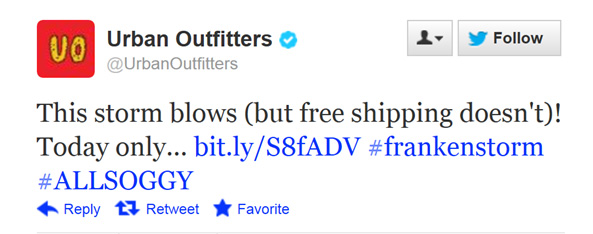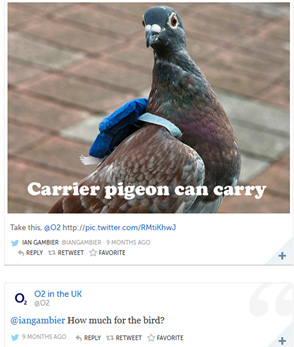So many articles out there just tell you what to do with social media when it comes to ecommerce; but what about what you shouldn’t be doing? There are so many opportunities to slip up when it comes to using social media for brand communications, and all so often in the public eye, with many just waiting for the chance to point out each and every one of your flaws.
In this article I’ll summarise some of the key mistakes you can easily make when using social media, and I’ll even throw in a few of the amazing clangers we’ve seen from brands over the last year. There have been some pretty good ones!
Here are my top five Don’ts when using social media for your ecommerce business…
1. Be inappropriate
Thankfully we don’t see too many online retailers getting it drastically wrong; however, it’s important to pay attention to appropriateness when it comes to social media for your ecommerce business. Social media is now responsible for being a major representation of your brand – not only does it potentially reach a huge audience, it is also interactive, giving a far higher level of engagement than traditional forms of marketing such as print or television, over which you will also have much greater control of your messaging. Social media is instant, you can’t put every tweet through a sign off process – your social media is about real-time engagement and timely responses. Delay is frequently perceived as negative and consumers increasingly expect a rapid response to queries regardless of time of day or night.
Ensure you have people you trust managing your social media communications and brief them in detail on your brand, your core values, key messages and any potential danger areas. This will minimise your risk of inappropriate conduct – very often it’s about perception – what your target audience perceive as appropriate may be deemed very inappropriate by another brand’s audience. Understanding your audience is critical, particularly if your brand is a little on the quirky side, but there’s a fine line, which Urban Outfitters crossed last year. Well known for their controversial marketing across all media, their #frankenstorm tweet caused outrage amongst even their most loyal consumers – bad judgement by a member of their social media team which had a huge impact on sentiment towards the brand:

O2 however did a better job recently when managing communications during a network outage and got their communications spot-on, resulting in a huge uplift in positive sentiment during a difficult time:

2. Be selfish
Social media is not all about me, me, me. It’s about your audience and engaging with them, getting to know them, and letting them get to know you. We all have that friend who can’t seem to talk about anything else except themselves, and it can get pretty painful at times. Think of your social media efforts as a little like being a good friend; listen, respond, listen, and listen some more. Your Gran was very wise when she told you “You’ve got two ears and one mouth...” And whilst the quote came originally from a very wise Greek philosopher in 55AD, it still rings true in the digital business world of today. We are all in business because we want to sell something in one way or another. Selling is in our blood; it’s an intrinsic part of our make-up as the people responsible for the success of our businesses. We naturally sell. And that’s where so many online retailers go wrong in social media.
Time and again, we see examples of retailers that blast out sales messages day-in, day-out and spare little time for small talk. They may think they are succeeding in getting their message out there, but what they’re not doing is making friends.
Today’s social customers don’t want to be sold to, they want to be listened to, they want to be cared about and they no longer just want a response from the brands with which they engage; they expect a response.
Sportsdirect.com, whilst not directly insulting anyone, is failing to engage its audience to any degree. Its Facebook page is crammed full of product promotions, daily offers and marketing messages and lacks any kind of meaningful conversation. And whilst Sports Direct is well known for discounted prices and special offers, this doesn’t mean that it shouldn’t make an effort to be sociable on social media. Higher engagement and a balanced approach to social media has repeatedly been shown to increase the reach of social media content, increase your target audience’s receptiveness to marketing messages and means a follower is less likely to hit the ‘unlike’ button. A good guide for the kind of ratio’s that you should be aiming for is 1:1:1 to give you a nice mix of self-promotional / own content VS sharing of others’ content VS engagement activity such as replies or conversations.

3. Think Measurement Doesn’t Matter
Whilst social media may very well be all about engagement, building relationships and awareness of your brand, it doesn’t mean measurement doesn’t matter. In the same way that (I hope) you wouldn’t send an email or run a PPC campaign without reviewing the stats, social media for ecommerce can and should be measured. Measuring assisted conversions is an obvious one, but there are lots of other areas that you can measure too such as mentions, retweets, likes and shares. And don’t forget the less tangible areas of impact such as goodwill, loyalty, awareness, reduced return rates and increased repeat purchase frequency. There are some great social media management tools such as Hootsuite that offer a basic package free of charge, and if budget allows, more sophisticated software such as Sentiment Metrics will allow you to track sentiment as well as helping you manage your social media communications.
4. Assume it’s not working
Social media is a little bit like SEO, in that you are in it for the long-haul, not just overnight fame. And whilst some sensational brands were created overnight on social media (we have YouTube to thank for Bieber fever), the majority have worked hard over long periods of time to build their audience and achieve results. Just because you aren’t seeing direct sales associated with social media does not mean that it isn’t having a positive impact on your business. Make sure you measure the areas that are important to you and stick with it, there is no room for yo-yo dieters in the world of social media – the most successful (when it comes to both dieting and social media!) are the ones that make a sustainable and consistent lifestyle change.
5. Smother your social media team
Whilst it is vitally important that whoever looks after your social media, be it agency, employee or you yourself, is well briefed on your brand values and messaging, it is also essential that they are empowered to make their best judgement call on what is and isn’t suitable for posting. Smothering them with detailed rules and restrictions will not only inhibit their creativity and freedom, it will also reduce the speed of response and the personal feel to your social media communications. Give them guidelines, but let them interpret these guidelines in their own way. You’ve employed them because you believe they are capable of doing the job – let them find their voice within those guidelines and you will see social media communications that are higher quality, more natural and certainly more engaging. Coca Cola led the way with this approach in the earlier days of social media by publicly releasing its employee social media guidelines which came to the sum total of a single page. If an organisation as large as Coca Cola can manage it, then almost any brand can.
Food for thought
Remember, social media is not a broadcast channel, it is channel of communication. Your target audience are trusting you by letting you into their personal space online. Almost all expect something in return. This may be as simple as information, opinion, insight, or it may be that they are interested in offers, discounts, promotions or even exclusive insight into new product ranges. Whatever it is they are interested in, make sure you know what it is, and most importantly, don’t abuse their trust in you. Maintain a sensible level of balanced communication, minimise the ‘spammy’ sales messages and… don’t forget to enjoy it! Social media is a fun place to be J





